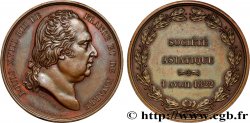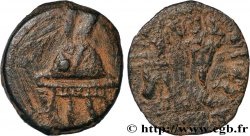fjt_946381 - ACADEMIES AND LEARNED SOCIETIES Académie de St Luc, émission de 1758 1758
60.00 €(Approx. 68.40$ | 51.60£)
Quantity
Add to your cart

Type : Académie de St Luc, émission de 1758
Date: 1758
Metal : silver
Diameter : 28,5 mm
Orientation dies : 6 h.
Weight : 8 g.
Edge : cannelée
Catalogue references :
Obverse
Obverse description : Buste à droite de Louis XV signé fm [n°338a], type Guéant Prieur 622G.
Reverse
Reverse legend : HAEC ANTIQUA MINERVA ; À L'EXERGUE : ACADEMIE. DE. SAINT. LUC. 1758.
Reverse description : Minerve assise à droite, tenant des deux mains l'écu des peintres de Paris.
Reverse translation : C'est l'antique Minerve.
Commentary
La première apparition d'une Académie de Saint-Luc à Paris remonte à 1391. Établie par le Prévôt de Paris, elle est entretenue par la Communauté des maîtres peintres et sculpteurs de Paris.
La création de l'Académie royale de peinture et de sculpture, en 1648, a permis à certains peintres et sculpteurs de sortir de leur statut d'artisans. Ceux qui n'y avaient pas accès se sont regroupés en 1672 sous l'égide d'une organisation nommée l'Académie de Saint-Luc, héritière de la Communauté des maîtres peintres et sculpteurs de Paris. Elle organisait également des salons.
À noter que les corporations de métiers artistiques en Italien sont appelées également Compagnie des peintres de Saint-Luc et depuis 1339 à Florence, la Compagnia dei pittori fiorentini di San Luca) ou Guilde de Saint-Luc dans toute l'Europe.
Pour plus de précisions, se reporter à l’article de wikipedia à http://fr.wikipedia.org/wiki/Acad%C3%A9mie_de_Saint-Luc.
La création de l'Académie royale de peinture et de sculpture, en 1648, a permis à certains peintres et sculpteurs de sortir de leur statut d'artisans. Ceux qui n'y avaient pas accès se sont regroupés en 1672 sous l'égide d'une organisation nommée l'Académie de Saint-Luc, héritière de la Communauté des maîtres peintres et sculpteurs de Paris. Elle organisait également des salons.
À noter que les corporations de métiers artistiques en Italien sont appelées également Compagnie des peintres de Saint-Luc et depuis 1339 à Florence, la Compagnia dei pittori fiorentini di San Luca) ou Guilde de Saint-Luc dans toute l'Europe.
Pour plus de précisions, se reporter à l’article de wikipedia à http://fr.wikipedia.org/wiki/Acad%C3%A9mie_de_Saint-Luc.








 Report a mistake
Report a mistake Print the page
Print the page Share my selection
Share my selection Ask a question
Ask a question Consign / sell
Consign / sell
 Full data
Full data










